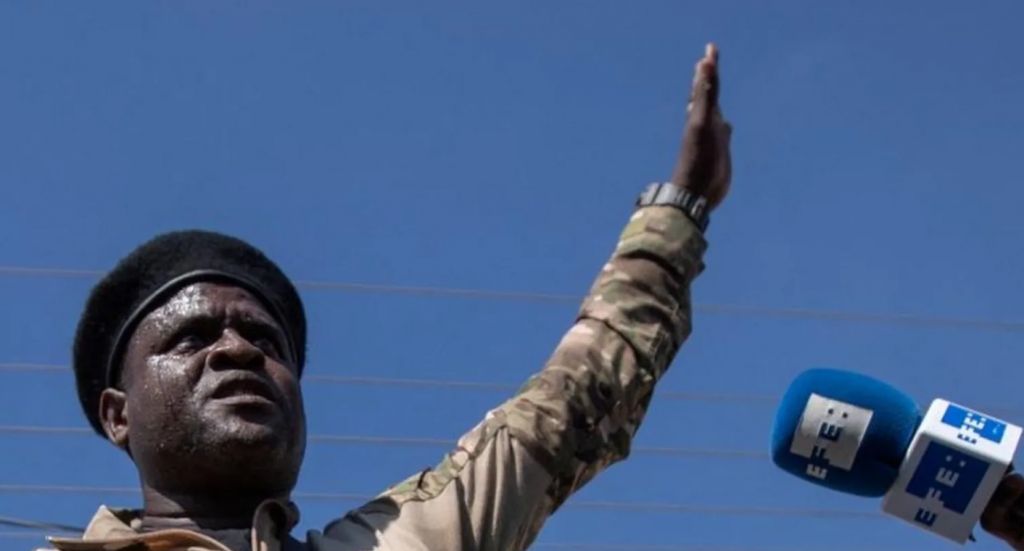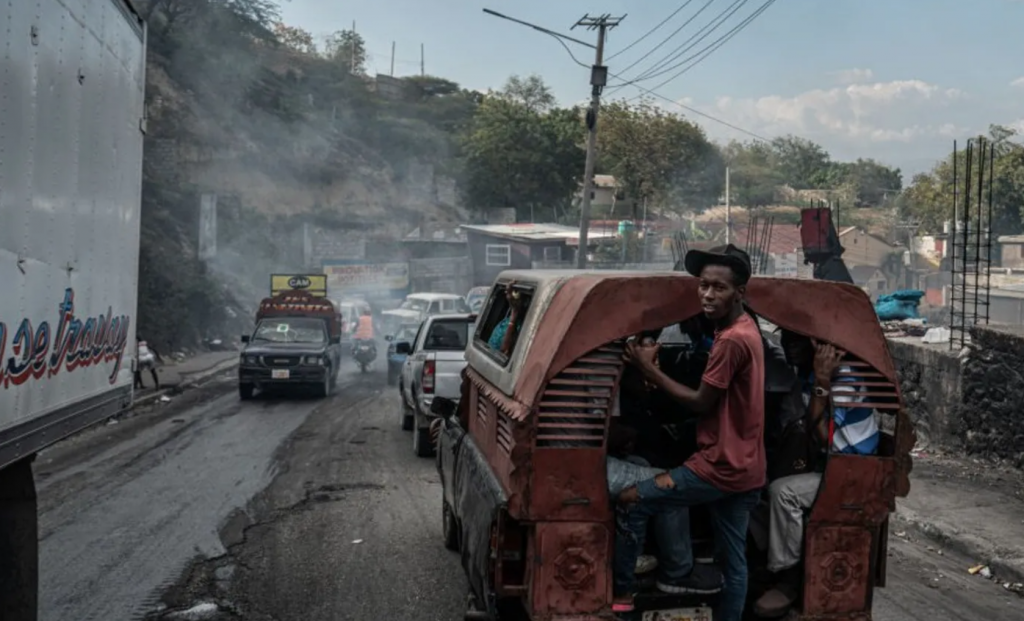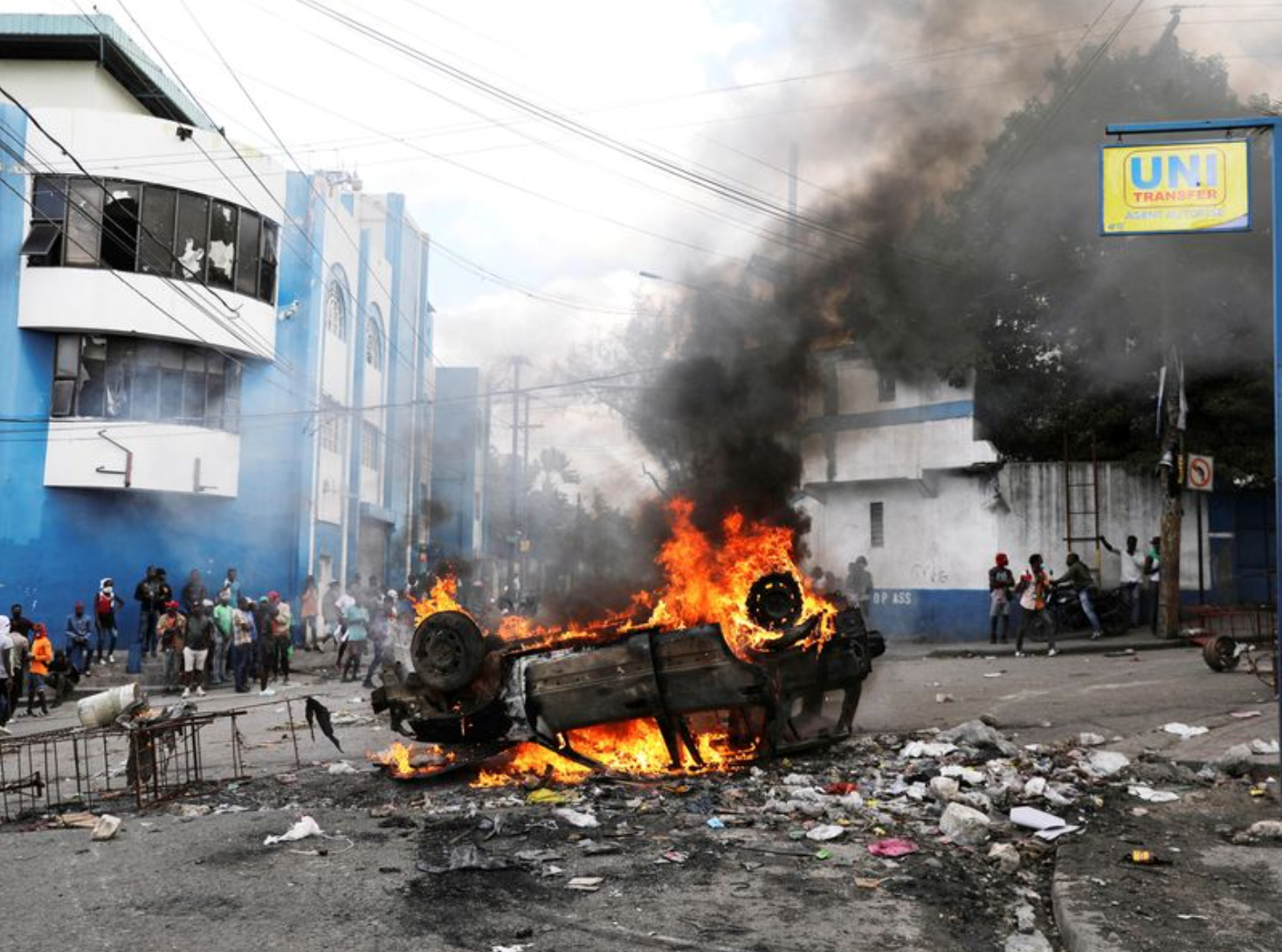Trigger warning: Brief discussions of sexual assault and violence against women.
Having spent the past decade and a half reeling from major earthquakes and epidemics that have killed and displaced hundreds of thousands, Haiti, the Western Hemisphere’s poorest country, has fallen into a state of anarchy and chaotic violence. Beginning in early March, gangs—which have ravaged the nation for the past few years—seized control of much of the capital city of Port-au-Prince in an effort to force the resignation of Prime Minister Ariel Henry. He has since promised to step down, but it remains to be seen when and if new leadership can be chosen and whether vicious gang leaders will be content with ceasing the violence, or whether they have only just begun to assert their power.
There exists no force within Haiti that is capable of resolving this crisis. The country has suffered from widespread hunger and disease for years, corruption is endemic within all civil institutions, its police force and military have already been completely overrun, and there are no elected government officials in the country given the indefinite postponement of national elections. Concerted and coordinated international intervention seems to be the best hope Haiti has of ending one of this century’s most severe humanitarian crises. However, the international community is overwhelmingly united in not wanting to get involved, raising the possibility that Haiti will be left entirely to its own devices. Any coherent and consistent worldview that values human rights, dignity, and justice cannot accept inaction in the face of such inconceivable human suffering.
A Failed State
Any understanding of Haiti’s current situation should be placed within the context of the country’s long, grim history of foreign exploitation, interference, and imperialism. Ever since the Republic of Haiti proclaimed its independence from France in 1804, becoming the first and only country to be born out of a successful revolution staged by enslaved persons, the global community has fought to suppress any ambitions the Haitian people had for a stable government. Forced to pay billions of dollars in reparations to French slaveholders and subjected to repeated American military and economic interventions that killed thousands and siphoned off the nation’s resources and industry, Haiti has never been given a real chance to stand on its own two feet.
When a magnitude 7.0 earthquake struck just 15 miles away from Port-au-Prince in 2010, the already beleaguered nation was plunged into utter devastation. More than 220,000 people were killed, over 300,000 were injured, and 1.5 million were left without homes. United Nations (U.N.) aid workers, stationed in the country since a military coup in 2004, were given the harrowing task of providing aid to a nation whose infrastructure and economy were decimated. In the end, the aid mission was closed in 2017 after a checkered tenure that included the introduction of cholera to the country, which has since claimed the lives of tens of thousands, as well as accusations of rampant sexual abuse, exploitation, and rape. A series of disasters since, including 2016’s Hurricane Matthew and a 7.2 magnitude earthquake in 2021, have only made the restoration of order more difficult.
Direct roots of the current crisis can be traced back to July of 2021, when President Jovenel Moïse was assassinated in his home by a group of Colombian mercenaries with links to ambitious political opponents. Upon his confirmation as Prime Minister shortly afterward, Ariel Henry promised that presidential elections would be held promptly to elect a new head of state. These elections never occurred.
The gang violence that plagued Moïse only increased following his assassination, as armed groups fought against government forces and one another to gain control of territory and infrastructure. Gangs, most notably the G9 group led by Jimmy “Barbecue” Chérezier, have increasingly taken hold of the country’s roads and fuel reserves, restricting commerce and creating shortages of necessities such as drinking water and medicine in many areas.

According to the U.N., more than 8,400 Haitians were killed as a result of gang violence last year, though no reliable estimate exists yet for the toll of this year’s escalated violence. More than 35,000 people have been internally displaced in 2024 alone, bringing the total population displaced by years of gang violence to more than 360,000. The U.N. also estimates that at least 5,000 women were raped or sexually abused last year, with reports suggesting that the frequency of such incidents may be increasing. Roughly half of the country’s population of 11.5 million people is in urgent need of humanitarian assistance, with millions having experienced acute hunger—verging on famine—for well over a year.
Prime Minister Henry repeatedly claimed that the level of violence was too great for the country to hold presidential or parliamentary elections. In January of last year, this failure to hold elections saw the country’s last ten elected officials termed out of office, leaving no governmental authorities on a local or national level apart from Henry and his cabinet.
Henry’s status as an unelected leader, his failure to control gang violence and to provide for his people, and his consistent avoidance of elections turned many Haitians against him. His repeated efforts to secure the backing of foreign military forces raised suspicions that he was more interested in maintaining his grip on power than serving the interests of the public. The African nation of Kenya agreed in October of last year to lead a U.N.-authorized police force designed to regain control of the country from gangs, but the country’s high court ruled the plan unconstitutional in January. Henry traveled to Kenya at the beginning of March to sign a deal to secure their support, at which point all hell broke loose back home.
Gangs, led by “Barbecue’s” G9, began coordinated operations to seize control of Port-au-Prince, shutting down its international airport, freeing nearly 4,000 inmates from two local prisons, taking control of many of the roads running into and through the city, and generally wreaking havoc on the city’s terrified residents. All of this was done in an effort to force the prime minister to resign and to prevent him from returning from his trip abroad. To this day, Henry remains stranded in Puerto Rico, unable to return home. Authorities estimate that roughly 80% of the capital city is controlled by gangs, whose escalated campaign of violence and brutality has forced more than 15,000 to flee their homes since the beginning of March alone and left hospitals without power and medicine to serve desperate patients with treatable ailments.

Now that Henry has resigned, it remains unclear what will happen next. The prime minister promised to formally step aside once a nine-member “transition council” is established, but there is no clear answer as to who will be able to form this body. The corruption, criminal ties, and power grabs that are prevalent within Haitian politics may obstruct any progress in this area, not to mention that the country has no parliament from which to pick a new leader. The same uncertainty applies to the criminal gangs that currently have the country at their mercy. “Barbecue” has attempted to frame himself as a revolutionary leader and has demanded that peace come with amnesty and political power for himself and his allies. Whether he and others like him intend to continue their use of violence following Henry’s resignation remains to be seen, as well as what they will demand from any successor government. The signs are not positive though, as violence has continued throughout the capital in recent days, targeting wealthy neighborhoods, prisons, and energy infrastructure.
The International Response: Reject and Ignore
Scores of Haitians have fled the country by land or sea over the past few years, but many have been returned to their tattered home country which no longer offers them any safety or opportunity. Haiti’s neighbor to the east, the Dominican Republic, has begun driving hundreds of migrants across the border each day, claiming that it simply does not have the capacity to host so many refugees without international help. The United States has also deported over 2,700 Haitian migrants back to Haiti since 2020, despite consistent warnings to American citizens to avoid traveling to the country. The Biden administration has created new pathways for Haitian migrants to request temporary asylum in the United States, but those who are unable to access these means are still vulnerable to deportation.
Nations across the globe have also been lining up to proclaim that they will not be intervening to help resolve Haiti’s domestic strife. Joe Biden has remained consistent in his vow that the United States will not send any force to Haiti, and his efforts to convince Canada to intervene were quashed last March. France, the country whose colonization and exploitation of Haiti contributed to its perpetual struggles, also remains firmly committed to keeping its distance. Kenya, despite having promised to lead an international force, now seems hesitant to intervene, with government officials saying that the mission will be postponed until a new government can be formed in Haiti.
The global response to Haiti’s trouble is thus characterized by neglect, avoidance, and a lack of care. The reasons for this are fairly straightforward. For one, this response aligns neatly with the long history of racist neglect and exploitation that Haiti has experienced at the hands of Western powers, especially France and the United States. But there also exist legitimate reasons for countries to be hesitant to intervene in this particular state. The instances when France, the U.S., or the U.N. have involved themselves in Haitian affairs have almost universally produced negative results. The United States occupied Haiti from 1915 to 1934, killing thousands of dissidents and siphoning off much of the country’s wealth. The U.S. again intervened in Haiti in 1994, this time in a more benevolent sense, to overturn a military coup that had deposed a democratic government. Though successful and bloodless in the short term, American involvement hamstrung economic reforms, preserved the power of military elites, and set the stage for another coup 10 years later.
It makes sense for international actors to be reluctant to intervene in a nation averse to foreign involvement, but that begs a crucial question: what feasible alternatives are there? The United States and France seem to believe that throwing money at NGOs and aid organizations will be sufficient, but these groups do not have the greatest record of actually helping the Haitian population, nor are they at all capable of providing aid to millions of starving people in a country ravaged by violence that lacks any government.
The United States prides itself, rightly or wrongly, on being the world’s foremost proponent of democracy and human rights. But this cannot be true if our words and lofty ideals are not put into action. As the wealthiest and most powerful nation on earth, it is ridiculous to outsource responsibility for aiding a neighboring country in dire need—in large part because of our historic actions—to a much weaker and less democratic country on the other side of the planet. At times, the laudable pursuit of peace must give way to the best interests of those suffering grave harm.
There exist no institutions in Haiti that can combat gang violence, provide aid to millions who are starving, and ensure the preservation of basic human rights; the world knows this, and the people of Haiti know this. Support must come from abroad and will likely require immense effort, coordination, and maybe even the use of force. This intervention would also need to be attentive to the mistakes of past actions and focus on establishing order so that Haitians may guide their own rebuilding process without having to conform to the self-interested desires of outside actors.
Foreign interference has deprived Haitians of any meaningful opportunity to establish a stable and prosperous nation ever since their country’s inception. It seems that this opportunity will only come once these crimes have been atoned for in a substantive manner. It is a dark stain against the character of this country and the entire Western world that this scenario is likely nothing more than a naive fantasy.
Featured Image Source: Sky News






Comments are closed.